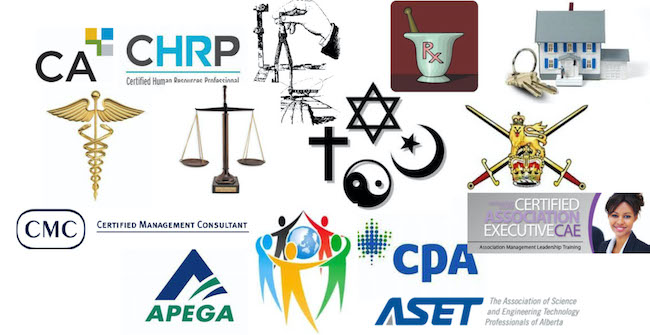How is a CMC different from a non-CMC consultant?
What does it mean to be a “Professional”?
It is useful to start by understanding what it means to be a “Professional”, a member of a “Profession”, plus The Professional Institute’s commitment to public protection/self-regulation; and how this is different from a tradesperson, a business executive/manager, or any other important member of our workforce.
The original “professions” dating back centuries, included: military officers, clergy, doctors, lawyers, and teachers. Since then, several other professions have evolved. “Professionalization” is a good thing for society. For CMC’s, there are several important considerations.
Criteria for Being Considered a Profession/Professional (all required):
- Full-time occupation.
- Specialized Knowledge - with specific education, training and competency development required.
- Codified Competence of practice areas and related areas -setting minimum standards of practice for certification.
- Ability to “know” the client & adapt to unique needs/situation – provision of due care & public protection.
- Exercise Judgment – application of critical thinking and use of experience, confidence along with knowing how avoid overstepping one’s abilities/knowledge.
- Ethical Behaviour – “loyalty to” and “in best interests of” client corporate body; compliance with laws and regulations, meeting or exceeding societal expectations, and in compliance with our Professional Code of Conduct.
- Personal Accountability and responsibility for one's actions and decisions.
- Fiduciary - hold s a position of trust; committed to honesty and integrity; avoidance of conflicts of interest, and subjugates own interests to that of the client organization. Indeed all your work as a CMC must be in the best interests of the client organization – separate from the “person” from the organization that hires you.
Next in this framework comes the role of the Professional Body. In some professions, the professional body may be called the “College” or “Institute” or possibly even an “Association” – though Association does not necessarily connote a professional body. Indeed, professional Associations are usually not the professional body, but the industry/profession promotional organization. In some cases, the Association negotiates professional fees, and/or conducts advocacy with government and communities, and/or promotes the services of their professionals to clients and consumers.
Self-Regulation
One of the most significant aspects of a profession and its professional body has been the concept of self-regulation – versus regulation by government or other entity. Government, through its registration of professions recognizes the importance of self-regulation to both protect the public/clients AND continuing to advance the practice standards of the professionals – as we learn more, as technology advances, as the “state of the art” is enhanced, and as societal expectations evolve.
Self- regulation is both a privilege and a commitment; and something that can not be taken for granted.
The assumptions behind self-regulation include:
- One must have the specialized knowledge and experience in doing the work of the professional in order to adequately understand and assess whether a professional in question is performing to standards.
- It is a responsibility and accountability as a professional to be watching peers, oneself and societal expectations and ensure self and colleagues perform to these standards of competency, act ethically and to Code of Conduct, plus fulfill their fiduciary duties.
- Public/client protection is a critical part of a “higher calling” of being a professional.
- The Professional collective continuously identifies, develops, and updates the codification of best practices expectations to advance the standards of practice.
- Promotion of client-first thinking plays a key role in providing the client with options and consideration of the implications of a solution for improvement – all with independent opinion and use of best practice knowledge and competency.
CMCs Competent in Multiple Areas of Consulting
Individuals certified as a CMC, have taken specialized training and education in all the key areas of:
- Financial Management
- Human Resources Management
- Information Technology Management
- Marketing & Communications Management
- Operations Management
- Strategic Management & Governance
Further, CMC’s have been nurtured and developed by more experienced CMC’s, then assessed to ensure their knowledge, judgement and personal practices in provision of advice and consulting work meets or exceeds regularly updated CMC Competency Framework 2018 – Pdf .
CMC’s are also required (as are other professionals such as pharmacists, lawyers, engineers), to engage in ongoing annual professional development to maintain their “currency” and “relevance” to evolving management consulting practice expectations and standards.
Finally, CMC’s commit prior to certification and annually in their re-certification, to follow our ethical guidelines and Universal Code of Professional Conduct.
As registrants of the Alberta Institute of Certified Management Consultants (ICMCA), CMC’s are part of a professional community wherein every other CMC is responsible for ensuring their CMC colleagues are living up to their professional practice standards and expectations.
The Fellow – Certified Management Consultant (FCMC) designation, is awarded to CMC-registrants of the Institute who have shown many years of ongoing excellence & innovation in their craft; significant contribution to the advancement of our professional community; and been exemplary in giving back to the community at large and being ethical in their work.



